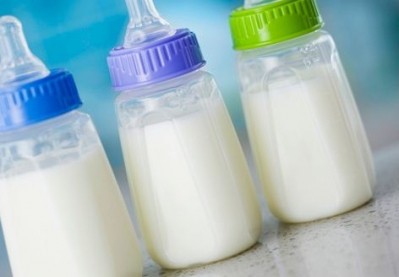EFSA publishes report that finds few benefits for infant formulas and other milks

The report, commissioned by the European Commission and compiled by Pallas Health Research & Consultancy in the Netherlands, scanned literature to draw conclusions for infant formula (0-6 months); follow-on milks (6-12 months) and children’s milks (12-36 months). It will inform an opinion EFSA itself is set to produce in the near future.*
“Results showed no disadvantage nor a clear benefit on health or nutrient status of infant formula with reduced protein content,” it concluded.
“Publications on infant formula supplemented with long chain polyunsaturated fatty acids, pre/probiotics, nucleotides, cholesterol, β-palmitate, palm oil and selenium did not show a clear benefit as compared to control formula.”
“Modification of iron or lactose content of infant formulae did not affect iron status or growth, respectively.”
“Results on comparisons of formula with breast milk showed that growth velocity was higher among formula-fed infants than for breast fed infants, but no further significant differences in clinical outcomes were observed,” the report said.
Breast milk lobby welcomes results
The conclusions were welcomed by the UK-based pro-breast feeding group, Baby Milk Action. Policy director Patti Rundall, OBE, told us, “We are pleased that EFSA found no evidence that the formulas for toddlers were needed, but more than that, we do need to be looking at the inherent risks of all these products and their role in increasing childhood obesity.”
She added: “It’s critically important that EFSA carries out this work - and ensures that the whole process is kept entirely free from commercial influence.”

She said, “a predominance of industry funded research” had damaged research quality in the area.
“It also impacts on health professionals’ knowledge, on policy makers and ultimately the information that is disseminated to the public.”
Infant formula producers were not available for comment at the time of publication.
The opinion followed a toddler milk-focused opinion from October last year, where EFSA’s Panel on Dietetic Products, Nutrition and Allergies (NDA) acknowledged that toddler intakes of nutrients like alpha-linolenic acid (ALA), docosahexaenoic acid (DHA), iron, vitamin D and iodine were a concern in some European countries but it found toddler or growing up milks were not the way to bridge such deficiencies.
“No unique role of young-child formulae with respect to the provision of critical nutrients in the diet of infants and young children living in Europe can be identified, so that they cannot be considered as a necessity to satisfy the nutritional requirements of young children when compared with other foods that may be included in the normal diet of young children (such as breast milk, infant formulae, follow-on formulae and cow’s milk),” the NDA said.
Infant nutrient deficiencies (or not)
The new report also scrutinised nutrient deficiencies concluding somewhat differently that, “in general, good peer-reviewed data on nutrient deficiencies in infants are scarce.”
“Reasons for differences in prevalence of deficiencies, besides basic diet, appear to be national supplementation and fortification strategies, different use of cut-off values for defining deficiency, selection bias in study populations and ‘real’ geographic differences.”
Infant formula and follow-on formula are currently regulated under the 2006 EU Directive on infant formulae and follow-on formulae.
Children’s or toddler’s milks, according to the EC, "are promoted as being particularly suitable for young children and, as such, under the current rules, may be considered as foodstuffs for particular nutritional uses."
Formula backgrounder
In late 2011 the German Federal Institute for Risk Assessment (BfR) concluded toddler’s milks were no better nutritionally than regular cow’s milk for over-1s.
It said the protein manipulation and addition of fatty acids, vitamins and minerals in infant drinks did not deliver nutritional bonuses to infants compared to normal dairy milk.
When it commissioned the report, the EC said EFSA's opinion should determine the, "necessity of growing-up milks' to satisfy the nutritional requirements of young children and, if considered appropriate, advise the Commission with respect to the appropriate age range and the essential composition of 'growing-up milks'."
Roger Clarke, president of Specialised Nutrition Europe (SNE), which counts formula manufacturers among its membership, previously said the group would welcome EFSA’s opinion and, “the EU model being used at international level”.
*Correction: This story has been amended to clarify that the report, whilst published by EFSA, was produced by a third party, Pallas Health Research & Consultancy. It will inform EFSA's own opinion on the matter which is yet to come.
















